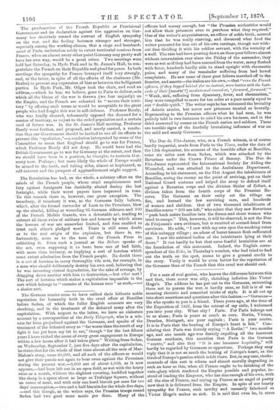The German armies seem to have sullied their hitherto noble
reputation for humanity both in the cruel affair at Bazeilles before Sedan, of which the fuller English accounts are very shocking, and in the treatment of the defeated army after the capitulation. With respect to the latter, we have an elaborate account by a correspondent of the Daily Telegraph, who is a wit- ness far from prejudiced against the Germans, and speaks of the treatment of the defeated army as " far worse than the result of any fight it has yet been my lot to see," though "for the last fifteen years I have visited the scene of every great engagement in Europe within a few hours after it had taken place." Writing from Sedan, on Wednesday, September 7, just five days after the capitulation, he states that for the whole of that time almost all the men of Mac- Mahon's army, some 80,000, and all such of the officers as would not give their parole not again to bear arms against the Prussians during the present war,-3,000 out of about 4,000, as it now appears,—had been left out in an open field, as wet with the heavy rains as a marsh, without the slightest covering, huddled together like sheep in a space about as large as Trafalgar Square, without an ounce of meat, and with only one hard biscuit per man for two days' consumption,—two and a half biscuits for the whole five days, —and this though, as the writer says, the Prussian troops round Sedan had two good meat meals per diem. Many of the
officers had money enough, but "the Prussian authorities would not allow their prisoners even to purchase what they required." One of the writer's acquaintances, an officer of noble birth, assured him that he was really starving, and devoured what food the writer procured for bun out of his own carriage, though not with- out first dividing it with his soldier servant, with the voracity of a wolf. The rain had been pouring down on these poor fellows almost without intermission ever since the Friday of the surrender, they were as wet as if they had been rescued from the water, many flushed with fever, hundreds hardly able to stand upright with rheumatic pains, and many of the remainder suffering from bad bowel complaints. He saw some of these poor fellows marched off to the frontier, and asserts—the italics are his own,—that "even the French officers, if they lagged behind for an instant, were beaten with the butt- ends of their [escorts"?] muskets and roared at, forward, forward.' " " Weak, sick, suffering from dysentery, fever, and rheumatism," they were compelled to move for ten miles at a pace nearly equal to our " double quick." The writer says he has witnessed the brutality of Asiatic armies, but never saw prisoners treated so brutally. Representing to the Prussian officers what he had seen, he was politely told in two instances to mind his own business, and in the third answered by curses on the French nation and soldiers. These are terrible signs of the fearfully brutalizing influence of war on the mild and manly Germans.






























 Previous page
Previous page